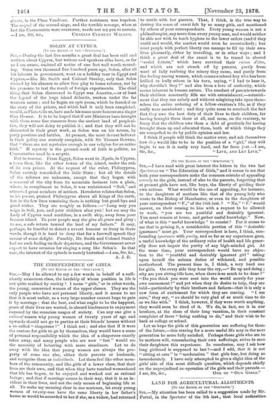[TO THE EDITOR OF THE " SPECTATOR.")
have read with great interest the letters in the two last Spectators on " The Education of Girls," and it seems to me that both your correspondents make the common mistake of appealing/- entirely to the girls, instead of also to the parents, forgetting that at present girls have not, like boys, the liberty of guiding their own actions. What would be the use of appealing, for instance, to the daughters of mothers like that of the young lady who- wrote to the Bishop of Manchester, or even to the daughters of your correspondent " F.," of the 16th inst. ? " No," " F." would answer, on their coming to him with a request to be allowed' to work, " you are too youthful and desirably ignorant. You must remain at home, and gather useful knowledge." Now, of what is this " useful knowledge " to consist ? For it seems to me that in gaining it, a considerable portion of this " desirable• ignorance" must go. Your correspondent is here, I think, con- founding ignorance with purity, and so far as my experience goes, a useful knowledge of the ordinary rules of health and life gener- ally does not impair the purity of any high-minded girL At the same time, your correspondent would have no objec- tion to the " youthful and desirably ignorant girl" taking upon herself the solemn duties of wifehood, and possible motherhood. The present time is, I think, a very hard one for girls. On every side they hear the cry,—" Be up and doing ; why are you sitting idle here, when there is so much to be done ?" "Do you think you were sent into the world merely for your- own amusement?" and yet when they do desire to help, they are told—particularly by their brothers and fathers—that it is only a new form of excitement for which they are craving. "I am sure," they say, " we should be very glad of so much time to di, as we like with." I think, however, if they were worth anything, they would soon be tired of it. We do, in fact, see it in our- brothers, at the close of their long vacation, in their constant complaint of there " being nothing to do," and their wish to be
at college or school.
Let us hope the girls of this generation are suffering for those- of the future,—this craving for a more useful life may in the next generation be more fully satisfied. Perhaps those girls who are to be mothers will, remembering their own sufferings, strive to save their daughters this experience. In conclusion, may I ask how long girlhood is supposed to last ?—and I add, that it is not " sitting at ease " in " moderation " that girls fear, but doing so- immoderately. I have only attempted to give a slight idea of the girls' side of this most difficult question, which depends chiefly on the unprejudiced co-operation of the girls and their parents.—


































 Previous page
Previous page